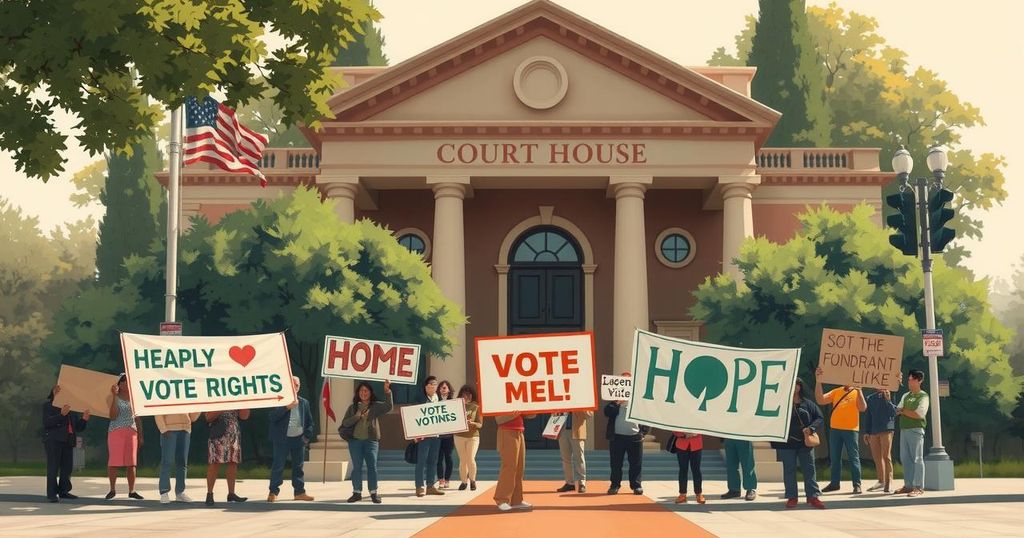Politics
ALASKA, AMERICAN SAMOA, ANCHORAGE, CIVIL RIGHTS, COLOMBIA, DEMOCRACY, GUAM, LAW, LEGISLATION, LGBTQ RIGHTS, MARIANAS, NEIL WEARE, NESBETT, NESBETT COURTHOUSE, NORTH AMERICA, NORTHERN MARIANAS, OCEANIA, PUERTO RICO, RIGHT TO DEMOCRACY, SAMOA, SOUTH AMERICA, TU, U. S, U. S. VIRGIN ISLANDS, UNITED STATES, WHITTIER, WHITTIER CITY COUNCIL
Fatima Khan
0 Comments
Community Rallies for Whittier Family Charged with Voter Fraud in Alaska
Supporters rallied outside an Anchorage courthouse for a Whittier family from American Samoa charged with illegal voting. The family contends that as nationals, they should have voting rights. The case raises important questions about citizenship and voting access for U.S. territories, with local politicians advocating for constitutional change.
A crowd of supporters gathered outside the Anchorage courthouse on Friday to stand in solidarity with a family from American Samoa residing in Whittier. They face charges of illegal voting ahead of their first court appearance. This case has potential implications for the national conversation surrounding voting rights for individuals born in U.S. territories.
The charges come from state prosecutors who contend that Whittier residents including the family members—who range in ages from their 20s to 60s—are not U.S. citizens but rather U.S. nationals, due to their status as American Samoans. This distinction prevents them from participating in elections, unlike individuals from other U.S. territories who acquire citizenship at birth. Prosecutors allege the family misrepresented their status when registering to vote.
In a related development, the Whittier City Council recently passed a resolution advocating for state constitutional amendments. This resolution seeks to grant voting rights in local and state elections to citizens from U.S. territories, including American Samoans, and reinforces a commitment to equal voting rights for all U.S. citizens.
This situation marks a significant legal precedent, as Neil Weare from Right to Democracy noted, claiming this is the first instance where American Samoans face prosecution purely based on their birthplace. Tupe Smith, who is part of the family facing charges, is represented by attorneys from this advocacy group who came to Alaska for the proceedings.
At the courthouse, roughly fifty supporters formed a circle for prayer and sang the traditional Samoan song “Lo Ta Nu’u.” They then took a group photograph before entering the court together. In the courtroom, nine family members made their initial appearances, collectively pleading not guilty. The arraignment for one other family member, currently out of state, is scheduled for the following week. Those unable to afford private attorneys were assigned public defenders, and all were released without bail.
Michael Pese, one of the charged individuals and a volunteer firefighter in Whittier, highlighted a significant disparity in rights. He stated, “If America goes to war, we get drafted. But we don’t have the vote.” Pese expressed gratitude for the steadfast support from the community, pointing out that the ultimate aim is to advocate for voting rights for American Samoans.
Pese, along with his family, has lived in Whittier for over a decade. His wife, Tupe Smith, was charged earlier this year after her candidacy for the school board. He conveyed the family’s desire to remain in Whittier, saying, “It’s our home.”
Meanwhile, Whittier’s mayor, Dan Blair, remarked on the incident’s broader impact, revealing concerns within the community following an intense investigation involving Alaska State Troopers in September. He characterized the event as unsettling and implied it may have been an intimidation tactic.
Blair pointed out that many families in the community are directly connected to the American Samoan heritage, stating that more than half of the schoolchildren have parents from American Samoa. He summarized the tense atmosphere in Whittier, recognizing how the situation affects the local youth: “The fear and the unknown — yeah, it’s inevitable it gets to the children.”
In summary, Friday’s rally in support of the Whittier family from American Samoa highlights a critical legal battle regarding voting rights in the U.S. The family faces significant felony charges related to alleged illegal voting practices, an issue that may alter perspectives on citizenship for those born in U.S. territories. The fallout from this case could have lasting effects on the rights of American Samoans and others in similar positions. As the community rallies in support, they express hope for change and recognition of their rights.
Original Source: www.adn.com




Post Comment